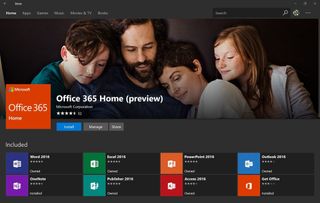Pros and cons of Xbox One keyboard and mouse support
Xbox is getting mouse and keyboard support, potentially upending the very nature of the video game console. But is that a bad thing?

For decades, couch-friendly controllers have been the go-to input method. Joysticks shrank, triggers crept, and the d-pad became secondary. However, PC gaming has typically revolved around the keyboard and mouse, offering greater mobility in first-person shooters (FPS), and allowing for games to be far more complex, such as real time strategy games (RTS).
It looks like this is all set to change, with the coming of mouse and keyboard gameplay options on Xbox One. Minecraft's "Better Together" beta already supports it, and more are on the way.
What does this mean for Xbox gamers? How will it be implemented? Let's look at the facts, as well as the pros and cons (with a side of speculation).
The facts
One of the biggest fears about keyboard and mouse support is the idea Microsoft will force Xbox gamers – who have enjoyed controller-only setups for years – to compete with other users on a keyboard and mouse. The very idea that you'd be able to just hook up a keyboard and mouse to play competitive shooters and similar games would destroy all notion of balance and fairness. Millions of gamers who have enjoyed balanced controller-only play for years would have to relearn how to compete and figure out how to fit a keyboard and mouse into their living room. Hopefully, that's not going to happen.

Speaking at PAX, Xbox Platform Chief Mike Ybarra said Microsoft was taking great care with the implementation. The first games to implement it will be co-op focused, such as the aforementioned Minecraft, and quite possibly Sea of Thieves, which recently announced both Xbox controller and PC keyboard and mouse players would share the same servers. Other games like the RTS Halo Wars 2 don't feature cross-play at all because it would simply unbalance the game, even in co-op play.
So how will Microsoft solve these issues?
Microsoft doesn't want to destroy the experience for those who have chosen controllers over keyboard and mouse.
Ybarra said that Microsoft will create an environment where multiplayer pools can be separated by input, presumably at a software level. It certainly seems as though Microsoft will have the capability to achieve this through the Xbox Live and Universal Windows Platform (UWP) APIs that Microsoft has complete control over. Ybarra said developers will be coached to be cautious about mixing controller types, due to the unfairness and imbalance they could create.
Get the Windows Central Newsletter
All the latest news, reviews, and guides for Windows and Xbox diehards.
The key takeaway here is that Microsoft doesn't want to destroy the experience for those who have chosen controllers over keyboard and mouse, while, at the same time, offering new options for gamers and devs.
The pros
Certainly, the key pro here is that you'll have the option of playing with a keyboard and mouse, obviously. Mouse controls in FPS games can offer more precision when aiming, without sacrificing fast turning and directional mobility.
Judging by Ybarra's recent comments, and older reassurances from Xbox head Phil Spencer, there will be separate playlists for keyboard and mouse players. Microsoft already implemented this on Gears of War 4, where Xbox players have the option of competing against Windows PC players or remaining on controller-only playlists.
Additionally, bringing full mouse support to Xbox One will massively reduce the development time on some games.


Cities: Skylines' UI had to be completely reworked for consoles. Seen here is the PC UI (left) vs. Xbox UI (right).
Management games like Cities: Skylines didn't hit consoles for years purely because the UI and control schemes had to be completely reworked and redesigned to be squished onto the relatively limited Xbox controller. Imagine a world where developers port cRPGs, RTS, management, and MOBA games to Xbox One without needing to worry about controller inputs. It could lead to a huge, huge boost for the Xbox Store, and thus the Windows 10 Store, as APIs become fully aligned and cross-platform capable.
The cons
Ybarra said Microsoft would leave it up to developers in how they implement mouse and keyboard support, which could, in theory, lead to annoying scenarios where keyboard and mouse input is favored by devs coming in from PC. Maybe the developers of the next big FPS decide that there won't be separate playlists at all, and controller players would just have to deal with getting wrecked by the faster mobility and accuracy of a mouse player. Ybarra said developers would be coached against doing that, but that by no means sounds like a guarantee.
It's easier to snipe with a controller when people are standing still, lol. #Battlefield1 pic.twitter.com/Q4hIZFTJD8— Jez Corden (@JezCorden) 4 September 2017
Turning up the joystick sensitivity for faster turning sacrifices cursor precision prohibitively on a controller.
Any implementation that negatively impacts existing Xbox customers could push them to other platforms.
Even if Microsoft does succeed in creating API-level separation of input types for creating segregated playlists, that could harm the size of player pools. In games like Battleborn, which suffer from really small player pools, dividing those players by input type will only make matchmaking times even longer, reducing the quality of skill-based matchmaking in the process.
For players who are happy with the current landscape and have no interest in keyboard and mouse gameplay, any implementation that negatively impacts existing Xbox customers could push them to other platforms such as PlayStation, which probably won't get keyboard and mouse support anytime soon.
Speculating on the future
While Windows PC gaming is experiencing growth, the PC market in general is in free fall decline. Mobile gaming has become a contender not just for casual gamers, but increasingly, core gamers, too. That's becoming a huge problem not only for Microsoft but also for Valve.
Valve runs the biggest gaming platform on PC by a large margin, and despite flirting with macOS and Linux, Windows PC gaming remains the dominating force in that sector. The failure of Windows gaming could mean the failure of Steam, and thus Valve, and while I'm by no means suggesting Windows PC gaming is in trouble, it looks as though Windows and Steam could become increasingly dependent on each other for growth.
It looks as though Windows and Steam could become increasingly dependent on each other for growth.
This seems to be the driving force behind Valve throwing its lot in with Windows Mixed Reality, which will include SteamVR games and support. VR won't grow if companies fight against Windows, which is required to power a lot of these experiences.
The dialogue between Valve and Microsoft also seems to have led to the opening of cross-network play between Steam and Windows 10 Store UWP games. Rise of Nations, an RTS recently remastered for Steam and Windows 10 UWP, enjoys cross-network play, despite using the Xbox Live APIs. Previously, UWP games on PC, like Call of Duty Infinite Warfare, have been segregated from the Steam version, creating pathetically small player pools for the Windows 10 Store version. I was told Steam was directly involved with making cross-network play a reality.

If Microsoft is to begin supporting keyboard and mouse playlists on Xbox One, perhaps bringing Steam PC players directly to Xbox Live could solve the player pool issues. Some games, like Rocket League, already feature cross-network play, but there's no need to separate by input, as neither control method gains a significant advantage.
If Microsoft and Valve play nice, perhaps Xbox and Steam can enjoy full cross-network capabilities in the future, where even PC players can opt for controller-only playlists, restricted by Steam's own APIs, lining up with Xbox's. Xbox could become a proper companion console for hardcore PC gamers who maybe want a solid 4K gaming device in the living room, with Xbox gamers enjoying larger player pools and higher quality matchmaking across the board. Killer Instinct is coming to Steam soon, and I'd throw down money to bet it'll feature cross-network play.
Xbox beyond gaming
Additionally, Xbox gaining mouse support further opens it up to non-gaming UWP apps, such as Office and other productivity apps.

For certain audiences, an Xbox could become a great budget gaming PC and light productivity machine, flipping between games, OneNote, or Word. As long as it is UWP native, Xbox will be able to run it without any changes required by developers.
The combination of Xbox and Windows Mixed Reality_requiring_ native UWP applications could lead to increased adoption of the format, particularly if Microsoft positions Xbox as an app store for the living room with developers. The new Xbox customizable Content Blocks, available in the 1710 update coming to Xbox One, have already been teased by Mike Ybarra as supporting third-party apps in addition to games, using Twitter as an example.
Final thoughts
Gamers concerned Microsoft is suddenly going to flood Call of Duty with keyboard and mouse players should rest assured that the company will strongly discourage that sort of scenario, if not ban it outright. Competitive games will get separated playlists at best. And I doubt the major players in the industry will have the balls to screw with the tried and tested formula for console gaming until Microsoft proves that it won't ruin the Xbox experience first.
As for non-competitive games, or games where keyboard and mouse input offers no advantage, like Killer Instinct, expect larger player pools, better quality match making, and potentially, a vast amount of new games that are too complicated or simply too costly to be redesigned for controller inputs.
There's also the prospect of Steam and Xbox gaining closer cross-network support, as the two companies work together to define the future of core gaming and VR, in a world where mobile seems increasingly unstoppable.
I believe Xbox gamers should trust Microsoft to get this right. Microsoft has no mobile platform, and PC gamers are skeptical of pretty much anything the company attempts in this space.
Microsoft (hopefully) knows what's at stake here.

Jez Corden is a Managing Editor at Windows Central, focusing primarily on all things Xbox and gaming. Jez is known for breaking exclusive news and analysis as relates to the Microsoft ecosystem while being powered by tea. Follow on Twitter @JezCorden and listen to his XB2 Podcast, all about, you guessed it, Xbox!
